|
When we first meet Helen there are two presumptions we can make about her; that her family has money and that both of her parents have probably passed away. She has, after all, free access to a large and isolated ancestral country home that otherwise sits empty. It's here that she has chosen to spend some time with her friend Anne, a writer in search of just the sort of peace and quiet she'll find here in abundance, having recently broken up with her boyfriend John for reasons that do not appear to be relevant to the story. The two women have not been there long before Helen begins to show signs of being troubled by something. Could it be gruff-looking handyman Brady, who seems to have lecherous eyes for the sternly disinterested Helen? Or maybe she really can hear things that others cannot, as she claims to Anne at one point. She's upset by sudden changes in the weather, is pathologically fearful of being left alone, and there's something about the nearby lake that deeply disturbs her. And what of Cora, the woman who accompanied her to the house on a previous visit and whose picture still sits on display in the living room? Was she unable to visit this time, as Helen claims, or is she actually in hiding somewhere in the house or the grounds?
These are just some of the questions you'll likely find yourself asking as the first half-hour of the 1974 psychological horror-thriller Symptoms unfolds. And that's not all that we're teased by here. There's a subtle suggestion that Helen's recent spell in Switzerland may not have been the work related trip that she has been claiming, and her interest in the attractive Anne appears to extend beyond that of close friendship, something Anne herself seems initially unaware of.
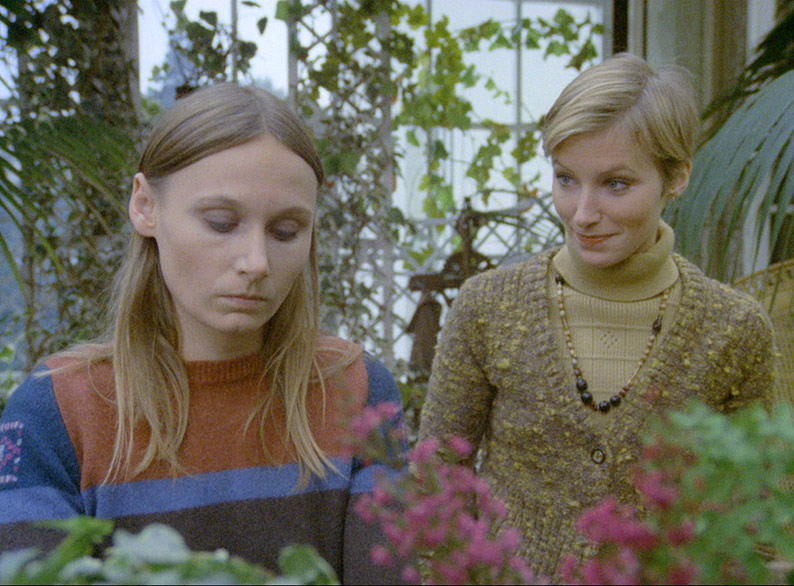
That these elements register as off-kilter at all is very much down to a canny marriage of performance and handling, the latter being the work of Spanish comic book artist and photographer turned director José Ramón Larraz. The case has been made more than once that an outsider will tend to see a country through very different eyes than a native and that's certainly the case here, as where we English tend to romanticise our countryside, Larraz portrays it from the opening frames as a host to dark secrets and potential threats. He's aided considerably in this task by the eerily off-key notes of John Scott's unsettling score, which infuses Trevor Wrenn's warm toned cinematography with an air of unspecified menace. It also invites us to read hidden meaning into just about everything that Helen says, and makes Brady's every look in her direction seem loaded with potentially sinister intent.
So what is going on here, exactly? Well that's where things get a little tricky for the conscientious reviewer, as to reveal too much about how things unfold would undermine one of the very real pleasures of this fascinating film. If you do choose to read up on it then you won't have to look far to find comparisons being made to Roman Polanski's 1965 Repulsion, and with very good reason. There are certainly a number of key similarities between the two, but to list and analyse them all would require going on a serious spoiler binge, and for the most part Larraz makes such distinctive use of these elements that the film never feels stuck in Polanski's shadow. This is clearly evident in the two films' handling of their respective lead characters' apparent disgust at male sexuality, as while Repulsion's Carol appears to find sex in all of its guises abhorrent, for the lesbian Helen it is exclusively men that she is sexually repelled by. And while in Repulsion, Carol is disturbed at night by the sound of her flatmate's lovemaking, in Symptoms it is Helen who is the source of such sounds, prompting a slightly naïve Anne to bang on her bedroom door in the middle of the night and ask if she is okay. This leads to a moment of considerable intrigue when Helen answers the door and assures Anne that nothing is wrong – when Anne attempts to look past her friend and into the room, Helen moves almost instinctively to block her, like someone trying to pretend that they're alone when they've been caught in flagrante delicto in a hotel room with their visitor's partner.
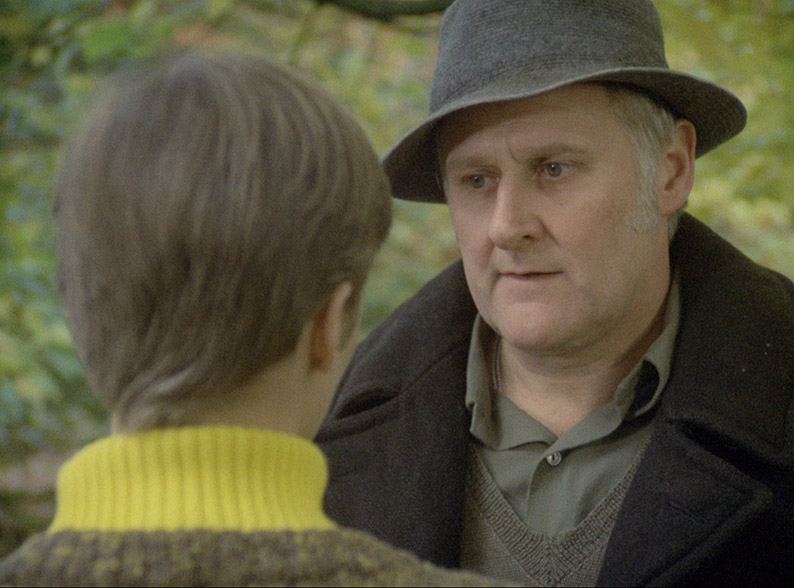
This blend of intrigue and slow-build tension is liberally scattered with unsettling clues and offbeat misdirection, and the sometimes subjective nature of the storytelling makes it intermittently hard to distinguish one from the other. Thus when we are hit with a brilliantly executed face-at-the-window shock, is the face in question real, a ghostly apparition, a flashback memory, or the product of Helen's troubled imagination? That Helen is dealing with some serious issues is clear from an early stage, and there are up-front clues to the cause that you'll probably not recognise as such on the first viewing. As her malaise deepens, our sympathy shifts to the curious Anne, and when she climbs apprehensively into an attic that can only be accessed from Helen's room and begins exploring by lamplight, I was genuinely chewing my fingernails in fear.
The performances are excellent across the board. Old hand Peter Vaughan gives the brooding Brady a brutish and darkly salacious edge, painting him as a potential physical threat who actually may be nothing of the sort, while Lorna Heilbron does a solid job of making the Sassoon-haired Anne a figure of audience sympathy and touchingly believable as Helen's close and trusted friend. But it's Angela Pleasence – and you'll have absolutely no trouble spotting that Donald Pleasence was her father – who ultimately carries the film as the increasingly troubled Helen. Initially coming across as waif-like and a little lost, she superbly captures (but crucially never overplays) Helen's developing psychosis, and when the plot takes a dramatic, second half turn, there are moments about which whole paragraphs could be written but which I can't really discuss without spoiling things for first-timers.
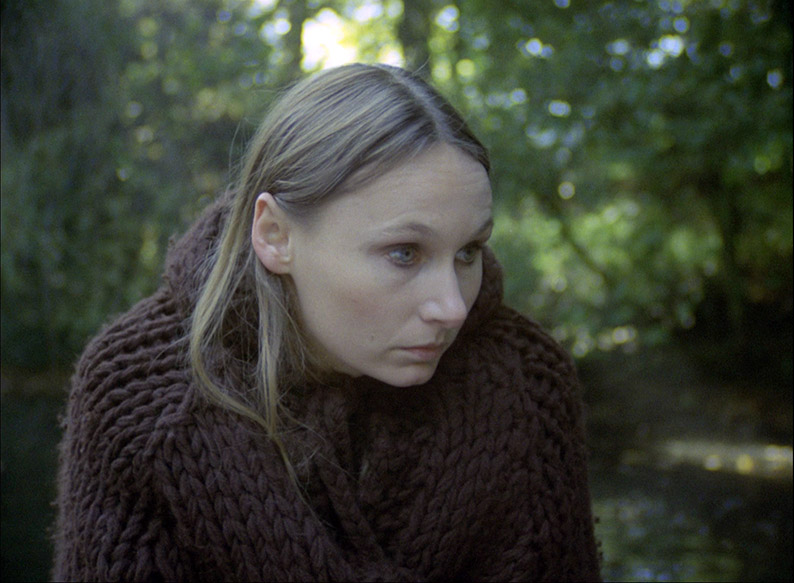
Despite being selected (alongside Ken Russell's Mahler) as Britain's Palme D'Or entry at the 1974 Cannes Film Festival, Symptoms all but dropped off the map in the years that followed and eventually found its way on the BFI's 'Most Wanted' lost films list. That the original negative was eventually found and subsequently restored is cause for real celebration, as this really is one hell of a rediscovery. Unsettling from the opening frames and propelled steadily forward by a building sense of dark intrigue and peaking in scenes of genuinely screw-tightening tension, it's an atmospherically shot, eerily scored and thoughtfully directed psychological thriller with an excellent central performance from an actress who, on the basis of this alone, made far too few films. A little seen work that deserves to find a wider audience, it fully earns its comparisons with Polanski's Repulsion and absolutely deserves to be discussed in the same breath.
Having become the subject of an active search by the BFI after finding its way onto their 'Most Wanted' list of 75 features not already preserved by the BFI Archive, the negative was found in the DeLuxe vaults, and with the help of the Belgian Cinematek and the film's producer, Jean Luc Dupuis, the film was restored to its current condition at 2K resolution in the original theatrical ratio of 1.33:1, with additional grading undertaken by the BFI. The results may not quite be reference quality, but they are considerably better than the 'lost film' label might lead you to expect. Detail is very good (check out the lace curtains when Helen watches Brady through binoculars from her bedroom), and while the colour scheme has a warm and earthy hue, when brighter colours do appear – on trips to the local village or in the red glow of the stove in Brady's shack – they are impressively rendered. Black levels are solid, though do soften a tad in darker scenes to retain picture detail, and there's hardly a dust spot to be seen here and no trace of distracting noise reduction.
The Linear PCM 2.0 mono soundtrack has also undergone some restoration, with issues such as pops, crackle, noise and hiss cleaned up in the process. The dialogue has a slightly narrowed dynamic range, but music is very clear and the audio shocks still deliver the goods.
Theatrical Trailer (2:04)
A surprisingly creepy trailer that gives just a little too much away to be watched just before the film itself.
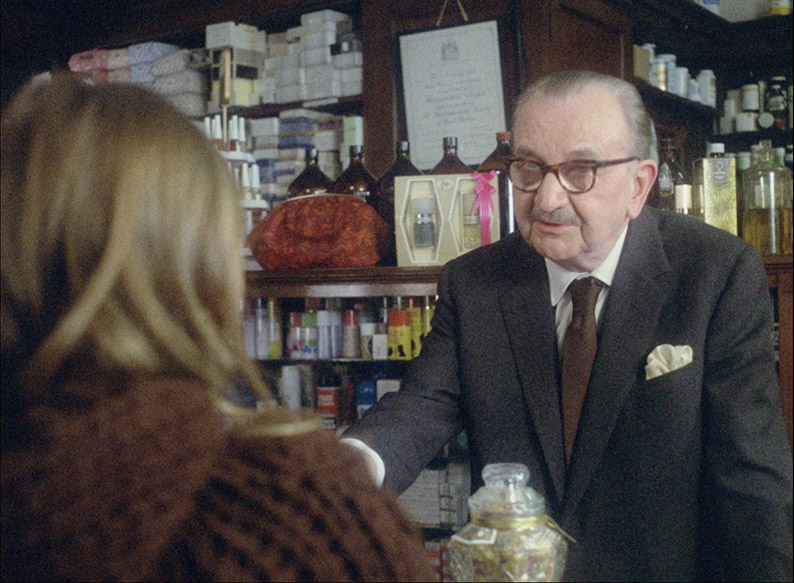
On Vampyres and Other Symptoms (73:37)
A cleverly titled Spanish documentary from director Celia Novis that is styled to feel almost like one of Larraz's own films, employing music and extracts from the soundtrack of Symptoms and Vampyres, as well as substantial clips from both, and rejecting any hint of a formal documentary structure. Larraz's career-changing meeting with director Josef von Sternberg is outlined in the sort of comic strip panels that Larraz himself used to draw for a living, while Larraz's own views are recorded in voice-over and eventually on camera. The most straightforward portion of the film accompanies Larraz to a screening of Vampyres at the Catalunya Festival of Fantasy Cinema, which he entertainingly introduces but baulks at the idea of sitting through again – he eventually agrees to stay in the lobby and "drink a coffee while the vampyres suck blood." Overall, it's a fascinating if occasionally frustrating work that is peppered with memorable input from Larraz, my favourite being when he talks to the festival audience about the fact that Symptoms was chosen as the British entry for Cannes: "Kind of weird that they chose a newly arrived Spanish guy, who'd just made his third film, to represent the UK. That way I could disappoint both France and Britain, two countries where I'd lived the longest." The quality of the clips from Symptoms included here is sometimes poor, but the BFI chose not to replace them with extracts from the restoration so that we might better appreciate the fate that the film had suffered prior to the rediscovery of the original negative. Job done, I'd say.
From Barcelona... to Tunbridge Wells: The Films of José Larraz (24:27)
A useful trip through the career of Symptoms director José Larraz, built around interviews with Larraz, editor (and later producer) Brian Smedley-Aston and Vampyres lead player Marianne Morris. Both Morris and Larraz suggest that Vampyres may have had a bit too much blood, and Larraz talks about the influence of author Thomas Owen on his films, his approach to cinematic sex, the advice given to him by Josef von Sternberg, his pre-film work as a comic book artist, and a good deal more. At one point Smedley-Aston lays the (then) strong sexual elements of Vampyres at Larraz's door, but quickly admits that he fully endorsed them, and Larraz tells us, "When I go to the cinema, when I watch television, I become cruel, I become everything! That is the miracle of the film. I become voyeur, peeping Tom, everything."
An Interview with Angela Pleasence (9:34)
Still looking every inch her father's daughter, Pleasence recalls landing the role of Helen in Symptoms and her working relationship with Larraz, whom she describes as a remarkable talent but dictatorial, a man who could get verbally aggressive if you dared to deviate from his plan. She has a couple of stories to back up her claim, one of which landed her in hospital, where the pampering she received turned out to be born from the fear that she might sue the production. She talks briefly about Peter Vaughan, who was her father's best friend, and reveals that an angry Larraz had to use a body double when she flatly refused to do the film's brief nude sequence. "Anyone who knows me would know that couldn't possibly be my tits," she assures us.
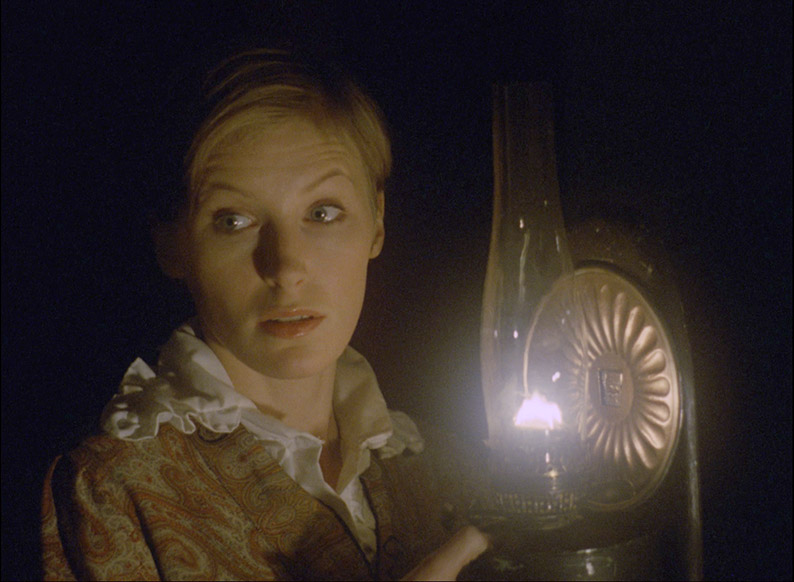
An Interview with Lorna Heilbron (17:55)
Actress Lorna Heilbron engagingly recalls landing the role of Anne in Symptoms, meeting and working with director Larraz (intense, very direct and with a very clear vision about how he wanted the film to look), getting on well and staying friends with Angela Pleasence, the experience of going to Cannes, and plenty more. She offers her own analysis of Helen's state of mind and what playing such a part must have been like for Pleasence, briefly covers shooting The Creeping Flesh and her joy at working with Peter Cushing, and even covers her later move from acting to psychotherapy. She appears to have very positive memories of making the film and describes its rediscovery as "a real joy."
An Interview with Brian Smedley-Aston (17:02)
Given his childhood, it seems hard to imagine that the film's affable editor would have gone into any other profession but film, despite some initial discouragement from his father. He had a hell of a start, too, working for Tony Richardson's Woodfall Films and getting his first screen credit on The Loneliness of the Long Distance Runner. He recalls the process of re-editing Performance with its co-director Donald Cammell, then covers his work on Symptoms in considerable detail, as well as subsequent work for Larraz on Vampyres (which he re-mortgaged his house to fund) and The Deadly Manor ("I don't think people will be talking about that in years to come"). If all this wasn't enough, he also edited cult favourites Squirm and Blue Sunshine for director Jeff Leiberman. Great stuff.
Booklet
The majority of space in this typically fine booklet is given over to Demons of the Mind: Contextualising José Ramón Larraz's Symptoms, a fascinating and in-depth essay on the film by Vanity Celis, one that explores the sexual psychology of the film and the links to (and possible influence of) Polanski. This is followed by the original Monthly Film Bulletin review by David Pirie (who is name-checked by Larraz in On Vampyres and Other Symptoms), credits for the film and the extra features, and detailed notes on the restoration.
Another excellent inclusion in the BFI's Flipside strand, Symptoms is a film I was previously unaware of and absolutely fell for, an excellent rediscovery that can now stand proud as one of the finest British horror-themed films of its day. The BFI's dual format release is superb, boasting a strong restoration and a luxurious collection of special features. Highly recommended. |